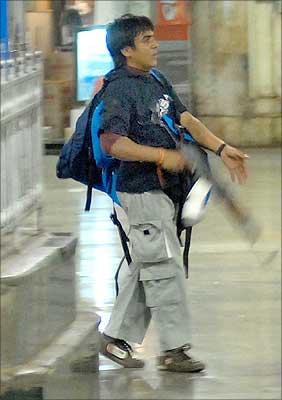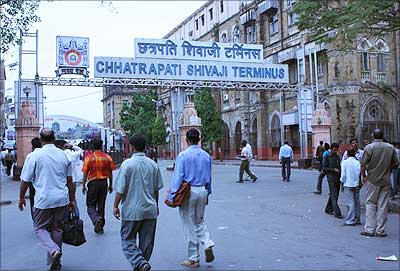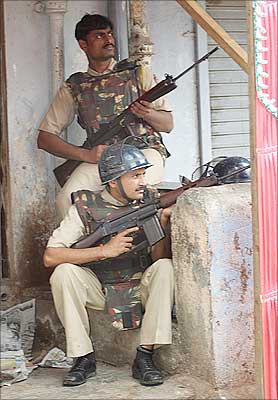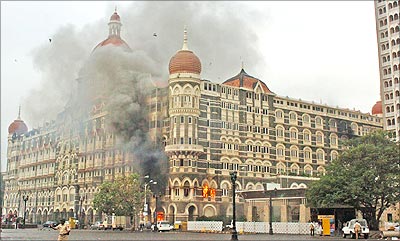Photographs: Photographs Courtesy: Sebastian D'Souza/Mumbai Mirror
In the first of a five-part series in March 2009, rediff.com brought to you an exclusive excerpt written by journalist Ashish Khetan detailing the initial interrogation of an injured Ajmal Kasab, the only surviving terrorist, in the early hours of November 28, 2008, even as the siege continued at the Taj Mahal and Oberoi-Trident hotels and Nariman House.
We reproduce the special
Additional Commissioner Tanaji Ghadge is fifty-one and more than half his age has gone into policing. A smile always lingers on his cherubic face but tonight it is sombre, almost mournful. Dyed black hair parted neatly down the side and hands held across the chest, he is staring into the camera, waiting for the cue. Above his right shoulder, the word 'Police' is painted on the wall in Marathi, in bold black letters. He is seated at a police desk outside the emergency ward of the Nair Hospital, a corner assigned to the police for fulfilling legal formalities and paperwork for cases involving accidents, shootout injuries, anything that falls under medico-legal cases. The time is 1 am, the date November 27, 2008.
On cue, Ghadge begins: 'I am the additional commissioner of Girgaum division. There were incidents of indiscriminate firing at the Taj Mahal hotel, the Oberoi hotel and the VT station last night which appear to be a well-coordinated terror attack. In an encounter with the police at Girgaum Chowpatty one terrorist has been killed while another has suffered injuries and has been brought to the hospital. It is important to interrogate him and therefore I am proceeding to question him.'
Next frame. A youth, seemingly in his early twenties, lies prone on a green plastic, the sheet being a protection from bloodstains for the white sheet that covers a mattress. A fine brown blanket has been pulled close to the chest of the young man who lies naked underneath. His thick mop of hair, greasy and dishevelled, is pressed against the bed's headrest. Wheatish in complexion, the youth is well built -- round arms, pumped-up biceps, and thick neck. His clean-shaven oval face bears a high forehead. There is a fresh injury on the chin smeared with an ointment, and a sledge-shaped bandage covers the right side of his neck. Apart from both the arms, which are bandaged from wrist to biceps, the torso bears no injury. He shows no signs of physical pain, only his forehead is creased and eyes are tightly shut, the stiffness of his face making clear that he is not asleep.
'Maine bahut galat kiya (I have committed a big mistake),' move the parched lips, catching a glimpse of the policeman walking into the room before shutting his eyes again. No question was posed, but Ghadge's walking in inspired the unsolicited admission. 'On whose instance?' 'Chacha ke kehne pe. (At the behest of Uncle.)' Eyes still closed; the voice betraying an effort to exhibit pain and earn empathy, more beseeching than replying. 'Who is this uncle?' Ghadge is staring down with bewilderment, still standing by the right side of the bed, near the young man's shoulder.
'The one from Lashkar.'
'Lashkar what? Which village he is from?'
'I don't know about his village. But he has an office... he keeps visiting the office,' the voice relaxes for a second.
'Who sent you here?'
'My father said we were very poor... our condition would improve... we will have food to eat... clothes to wear,' an emotional explanation, an excuse embedded in the reply.
'Was he your real father?' an incredulous Ghadge enquires.
'Real father... real father,' the man seemed determined to condemn his father.
'What's your name?' asked Ghadge, a fountain pen ready to scribble on a writing pad.
'Ajmal.'
'What's your age?'
'Twenty-one.'
'Where is your gaon (village)?'
'Faridkot in tehsil Depalpur (administrative division), district Okara.'
'Who all are there in your family?'
'Mother... sisters.'
'Mother's name,' asks Ghadge, hardly looking at him, concentrating hard on the writing pad.
'Noor Illahi.'
'Her age?'
'Wahi koi chaalis ke aas paas. (Must be around forty years.)'
'What's your father's name?' Ghadge continues.
'Amir,' eyes still closed, head at ninety degrees to the pillow, body, hands and legs stiff like dead.
'What's his father's name?'
'Shahban.' His eyelids open for a split of a second before closing again.
'What's the surname?'
'Kya? (What?)'
'What's the surname? Khandaan ka naam kya hai?' Ghadge makes his question simpler.
'Kasab.'
'Are you a butcher?'
'No. We are not in this business� just the name has stuck.'
'So, Amir Shahban Kasab, that's your father's name.'
'Yes.'
'What's his age?'
'Somewhere around 45 years,' head jerks a trifle, before stiffening again.
'What does your father do?'
'He sells dahi-wade. Sometimes in the village... sometimes he goes to Lahore city ... It's difficult to run the family,' Kasab now opens his eyelids, catching a glimpse of his interrogator from the corner of his eyes.
Excerpted from 26/11 Mumbai Attacked, Edited by Harinder Baweja, Roli Books, 2009, with the publisher's kind permission.
'I was a labourer till 2005'
Image: CST Station, which was the first to be attacked on November 26, 2008Photographs: Sanjay Sawant/Rediff.com
How many brothers are you?' Ghadge determined to know every bit about his family.
'Hum teen bhai hai (We are three brothers.)'
'What are the names of your brothers?'
'Afzal and Munir.'
Questions and answers continue like this in one-liners.
'What are their ages?'
'Afzal is around four years elder to me. Munir is around four years younger to me.' The recording and remembrance of age he seems to do only in relative terms.
'Which means Afzal is twenty-five and Munir is eighteen?' Ghadge gets his math wrong with the younger brother's age.
'Haan sahib. (Yes, sir.) You can deduce that,' Kasab not the least interested to correct him.
'What do your brothers do?'
'Afzal works as a farm labourer in the village itself,' Kasab replies with a groan, remembering he is injured and in pain.
'Is Afzal married?'
'Yes. He is married to Safia. He has two children: one son and one daughter. Son's name is Ali. He must be around seven to eight years. Daughter's name I don't know. She is just one-year-old. She was born when I was away from home for training. I don't know what they have named her,' Kasab, for the first time makes a departure from one-line replies.
'Where is Safia's paternal home?'
'She is my maternal uncle's daughter. They are from Lahore.'
'What's the name of the village?'
'There is no village. They stay in Lahore city. At Safawala Chowk, near Nizam Adda in Lahore. Her father's name is Manzoor. She now stays with her parents. They had a fight, my brother and his wife. After that she stays with her parents,' Kasab, on his own, provides the unsolicited information about the break-up between his brother and his wife.
'Why was there a fight?' Ghadge asks, showing interest.
'Don't know exactly. Paise ke kharche ko lekar jhagda hua hoga. (Must have been over how money was being spent.)' Kasab puts it down to the money, or the lack of it.
'Where did you say her father's home is?'
'At Safawala Chowk, near Nizam Adda in Lahore. I have been there many times. After getting off at Nizam Adda it's quite close by. It's near a bank.'
'What's the name of the bank?'
'Don't know; it is a big bank. Anybody will tell you.'
'What does Munir, your second brother, do?'
'Woh sakool-wakool jata hai. (He goes to some school.)' Kasab doesn't attach much importance to his younger brother's occupation.
'Sakool means?' Ghadge fails to get Kasab's pronunciation.
'Sakool ... sakool, ' Kasab tries his best, surprised the cop is not getting it.
'Sakool ... school, you mean?'
'Yes.'
'What about your sisters?'
'I have two sisters -- Rukaiya and Suraiya.'
'Where are they?'
'Rukaiya is married. She is around one and a half years elder to me. She lives with her husband in Pathankot.'
'Where in Pathankot?'
'It's a small village, adjacent to Havelilakha. You ask anybody about my taye (elder uncle). His name is Nisaq. Anybody will tell you. It's a small place.'
'You said she is married?'
'She is married to my taye's son. Her husband's name is Hussain.'
Ghadge, as if he has had enough of his family, skips enquiries about Kasab's younger sister Suraiya and switches back to Kasab's own life, at the time the centre of Ghadge's curiosity and in days to come of an entire nation.
'How much have you studied?'
'Till fourth standard. In 2000 I quit sakool.'
'Which school was it?'
'A primary village sakool. In my village.'
'And after that?'
'I first worked as a labourer in my village. After some time I moved to Lahore and started working there.'
'What labour job?'
'Mazdoori. Cement, etc. Bricks, etc. Working with a mistri. Construction work. For five years I stayed in a mohalla called Tohidabad, gali number chauranja, makaan number baraah.'
'Chauranja? One and four?' Ghadge fails to get Kasab's alien dialect.
'No, chauranja: five and four,' says Kasab correcting Ghadge, seeing that his wretched past is recorded correctly. 'There was a subzi mandiclose to that house. I stayed there till 2005, along with other labourers. We stayed there on rent. Now I have heard they have razed the quarters and constructed a building in its place.'
'You came back to your village in 2005, after five years?'
'In between also I made a few trips. But in 2005 I returned to my village.'
...
'We were meant to die here'
Image: Cell phone footage of the arrest of Ajmal Kasab.
Then?'
'Sometime in 2007 my father took me to Zaki chacha and asked me to work with him.' Kasab, cutting straight to 2007 from 2005, skipped details of the two years in between.
'Who is Zaki chacha?'
'He is the big man of Lashkar.'
'Where was his office?'
'In my village. In Depalpur.'
Then Kasab, in an accusatory tone, added, 'Zaki chacha would say: Work with me. You will bring a good name to your family. You will get money. It is Allah's work.' Kasab implies he never believed in what Zaki told him -- either an honest admission or a clever ploy to blame it on Zaki, having been misled by him. 'My father said: You will live the way they live. You will eat well. Clothe well. Live a life of comfort. Your brothers and sister will get married,' says Kasab, implicating his father too.
'You went along with Zaki.'
'No, I worked at Lashkar's office in the village...'
'Was your father from Lashkar?'
'No. No. He just introduced me to those people. I told you they have an office in my village. Many people used to visit the office.'
'What would Zaki say?'
'Fala fala ho jaayega. Fala fala ho jayega. (This will happen, that will happen). After waging jihad we will earn a lot of respect, lot of money.Yeh sabaab ka kaam hai. (This is a virtuous task).'
'What else he would say?'
'Ajar milega. (You will be rewarded). Izzat milega. (And respect). You have to wage jihad.'
'What will you get after waging jehad?'
'Paisa, izzat.(Money, respect).'
'What else did Zaki say?'
'He told my father to leave me in the office. From then on I was in Allah's custody.'
'When did you join this?'
'I don't remember� possibly a year and a half back.'
'And when did you receive training?'
'It was snowing.'
'So it was around January or December?'
'Possibly... (pause). When Benazir Bhutto was killed. Then we were receiving the training.'
'Were these people involved in killing Benazir?'
'I don't know. They do many things. In Afghanistan... I don't know.'
'How many people were there in training?'
'Twenty-four to twenty-five people were there.'
'Where was this training organised?'
'In Mansera. In the hills. Near a village called Battan. They trained us in pistols, Kalashan, magazines that are attached with it, in grenades.' Kasab calls Kalashnikovs 'kalashan'.
'Do you know the names of others who were with you at the training?'
'No, I know just one boy. He was also from Lahore. We became friends. We were not allowed to know about each other. They were very strict.'
'Did Zaki come to train you?'
'No, he would come only occasionally� You see, he is a very busy man. He would say we will go to heaven. I said, bhago yaar, main yeh nahi kar sakta. (Let's run... I can't do this).'
'Where were you all supposed to go after today's incident?'
'Nowhere. We were meant to die.'
'How many people did you kill at the CST station?'
'Don't know. I finished two-and-a-half magazines. Don't know how many I killed. Just kept firing. Zaki had told us to keep killing till we were alive.'
'For how long were you supposed to carry this out?'
'As long as we could. Until we died.'
'How many of you have come to Mumbai?'
'We were blindfolded. We came in a ship. And then we got into a launch. You know where the launch from India and Pakistan meet, there we got into an Indian launch,' Kasab tries to evade the question on the total number of his accomplices.
'Who provided you support here in Mumbai?'
'I don't know. There are some mujahids who come to India and settle down. We don't know about them. We were sent to die.'
'We came because we were promised money'
You have come to wage jihad in India?'
'What jihad saab?' Kasab breaks down. No tears. Just the face contorts as a rhythmic, nasal sound of crying comes out.
'There is no point in crying now,' Ghadge sounds a little sympathetic. 'Ordinary people, just like you, have been killed... Why didn't you think earlier? Where else have you waged jihad before coming here?'
'Nowhere. Nowhere,' Kasab interrupts his crying.
'What were you told?'
'Just keep shooting, keep shooting till you die,' he now stops crying.
'What were you supposed to get in return?'
'Money. Zaki chacha was supposed to give money to my family.'
'How much money have you got for this?'
'He would give money to my family. He had promised to give a big amount to my family for this.'
'How does Zaki look?'
'He has a black beard with strands of white. His age would be forty to forty-five years. He went to Afghanistan and finished Roos (Russia),' Kasab reiterating the legend of Zaki he must have heard a thousand times.
'What lecture he used to give?'
'He would give lectures only once in a while. Bada masroof rahta tha. (He would keep very busy.) "You are Muslims. You have to get rid of poverty. Look at India. They have raced ahead of us. They kill your people. You have to wage jihad against India'."
'What is the meaning of a jihadi?'
'I don't know.'
'Just try explaining it to me?' Ghadge insists.
Kasab keeps mum.
'If you don't know then why have you come here?'
'Because he used to give me money. Otherwise you tell me, khate-peete ghar ka bhala koi jaayega? (Will a well-to-do person go for such work?)' Kasab blames his poverty again.
'What has Zaki chacha got in return?
'He is a jihadi... he does this for jihad.'
'What is the meaning of jihad?' Ghadge returns to his original question.
'To try to do something for the Muslim religion,' Kasab tries explaining seeing that the policeman won't relent.
'What do you understand from jihad?'
'Don't know, we just got money. You don't have clothes to wear, don't have food to eat, and Zaki chacha would throw davats (feasts), for the first few months we just ate, poor boys, not-so-poor boys, we all just ate and had fun. And then he picked a selected few and sent us for the training. But all who came were poor,' Kasab returns to his favourite topic, his poverty, having failed to elucidate the theological cum religious subject of jihad.
'Where were you before you came to India?'
'We stayed in a lodge in Karachi. We would go fishing and have fun. I thought I would continue to work as a security guard there. Family back home was also getting some money. Suddenly one day he summoned all of us and said that the time had come to do big deeds, to become big. We would get money. We would get sabaab.'
'You got shabaab?'
'Dekho babu. Agar masrufiyat na ho, ghar me khane ko na ho to kya karoge? (See, if you are not busy with work, there is not enough to eat, what will you do?)'
'So did you get shabaab in Pakistan?' asked Ghadge, confusing sabaab with shabaab, the former implying reward, the latter women, finally unable to resist the question on account of the repeated mention of the word.
'What sabaab? What to say saab?' Kasab fails to comprehend the query.
'No. But did you get shabaab? Majaa kiya? (Did you enjoy?)' Ghadge puts it across explicitly. (Later, he told this journalist he wanted to know if the terrorists had also been lured with women.)
'Chee, chee. Gande kaam main nahi karta. (I don't do dirty things.) Sabaab maane ajar. (Sabaab means virtuous deeds).'
'What kinds of weapons were you trained in?'
'Peeca-meeca, grenade, pistol, kalashan and the equipment that fits in Kalashan.'
'Peeca-meeca?'
'Peeca... peeca.'
'After training were you allowed to take the weapons with you?'
'No.'
...
'We were meant to kill anyone in sight'
Image: The Taj under attackWere Pakistan army personnel used to train you?'
'I don't know. The organisation is being run for a very long time. They said the work first started from Afghanistan.'
'Did you ever ask Zaki if he ever had done jihad himself?
'Yes. He said he had done it... in Afghanistan.'
'Didn't you feel for the innocent people you fired at?'
'To become a big man you have to do such things.'
'How did you reach Mumbai?'
'In a launch. In an Indian launch. There were four-five fishermen in the launch. We abducted them near the border of Indian and Pakistani waters. After that when we were just some miles off from the Mumbai coast we got into a speedboat and sailed towards Mumbai and got off near a fishermen colony.'
'From where did you start in Pakistan?'
'In Azizabad. There is a place called Kasmabaad. It's close to the sea. Kasmabaad is a big place. It's a jungle. Well, not exactly a jungle, since there are shanties and shacks and villagers. What's that place called? Yes, Buharo. There's a place called Buharo. It's a jungle. A road goes to that place. We all sat in a jeep with black, tinted glasses and went to the sea.'
'When was it decided to attack Mumbai?'
'A month back. Ismail and I were called. We were shown the target. A video CD was shown to us. We were shown the VT station. And the road that goes towards the station, from the side of Azad Maidan. We were supposed to go on that road to Taj Mahal hotel. We were told Azad Maidan would come. We were told about the work we had to do.'
'What work?'
'Of VTS,' said Kasab. (VTS implying VT station.)
'VTS or ATS?' Ghadge wanted to know if the terrorists had a specific plan to target the Anti-Terrorism Squad office or its officers.
'The place where there is a station,' explains Kasab.
'What kind of office was there in the CD?' Ghadge probing further into the possibility of ATS office being one of the targets.
'There was no office. There was a man. You can't see his face. He was walking around the station and a voice in the background was narrating, explaining the layout of the station.'
'Who were you supposed to kill?'
'Ordinary people. We were meant to kill anyone who would come in sight. Ismail and I had the same target.'
'How did you get hold of the police vehicle?'
'We wanted to escape. We came down from the terrace of the hospital. We were shuffling along, hiding along the way. We would walk some distance, again hide, like that. Then this police vehicle came. They fired at us. I fell down, I suffered bullet injuries on both my hands. Ismail did his job. He fired at the policemen in the vehicle. Then he hauled me up into the vehicle and he drove.'
'How did you get the Skoda car?'
'We took it from there, don't know the name of the place. Our vehicle got punctured. Then we saw this Skoda car. We took the vehicle at gunpoint.'
'Did Zaki chacha come with you on the ship?'
'Chacha came only up to Karachi.'
'What's the name of your sangathan (group or organisation)?'
'What?' Kasab doesn't understand the Hindi word.
'What's the name of your sangathan? Gang?'
'Lashkar-e-Tayiba,' murmurs Kasab, the word 'gang' striking home the question.
'And what is Deccan Mujahideen?'
'I don't know.'
'How many weapons did you have?'
'We had one AK-47, one pistol, eight hand grenades and six magazines.'
'What was your plan?'
'To kill people. And then take a stronghold. Take people hostage. And then make demands.' The use of the word, stronghold, takes Ghadge by surprise.
'Make demands to whom?'
'To the government.'
'What demands?'
'Woh peeche se batane waale the. (They were supposed to inform us later on).'
'How would they have informed you?'
'On the phone.'
'How much money did you give the cabbie who drove you to the VT station?'
'100 or 1,000. Don't remember,' says Kasab.
'How much money in all did you have?'
'5,400 rupees each we had on us.





article